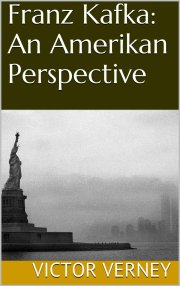Franz Kafka: An Amerikan Perspective
I. Writer as Adjective
 It is a rare writer, observes one critic about Franz Kafka, who produces a body of work so coherently integrated and so thoroughly imbued with his own unique perspective that his name becomes an adjective. One thinks of Nicollo Machievelli, the 16th Century Italian politician who wrote The Prince. He gave us the term “Machievellian,” which defines a world of cut-throat politics marked by cunning and duplicity. But artistically speaking, his writing is more of a realpolitik survival guide than a poetically rendered literary vision. So here, a better example, perhaps, might be Charles Dickens, 19th Century English novelist. His accounts of institutional abuses and the inhumanity of commercialism and industrialism gave us a “Dickensian” world populated by an abundance of vividly humorous, grotesque or sinister characters.
It is a rare writer, observes one critic about Franz Kafka, who produces a body of work so coherently integrated and so thoroughly imbued with his own unique perspective that his name becomes an adjective. One thinks of Nicollo Machievelli, the 16th Century Italian politician who wrote The Prince. He gave us the term “Machievellian,” which defines a world of cut-throat politics marked by cunning and duplicity. But artistically speaking, his writing is more of a realpolitik survival guide than a poetically rendered literary vision. So here, a better example, perhaps, might be Charles Dickens, 19th Century English novelist. His accounts of institutional abuses and the inhumanity of commercialism and industrialism gave us a “Dickensian” world populated by an abundance of vividly humorous, grotesque or sinister characters.
Moving into Kafka’s own era of the early 20th Century, we find Ernest Hemingway’s once-vaunted heroic code which has fallen into general disfavor and is now a favorite target of attack by feminist literary scholars. The “Hemingwayesque” protagonist straight-forward, manly, stoic, loved by beautiful women and respected by fighting men, lives out a mindset incurably involved in scenes of romanticized violence in exotically picturesque locales. In this context, a discussion of the “politically incorrect” readily brings to mind George Orwell’s name, which has become synonymous with a dystopian nightmare view of the future. The “Orwellian” worldview is one of totalitarian superstates where powerless citizens live under constant surveillance by Speech and Thought Police.
And to the millions who have read the brooding, unsettling, but at times absurdly hilarious novels, stories and prose poems of Franz Kafka, and to millions more who have never read a word of his, the term “Kafkaesque” immediately brings to mind the image of the small, anonymous individual trapped in an existential nightmare from which there is no escape and no awakening.
 [The rest of this article, a presentation I delivered at the National Czech & Slovak Museum & Library in Cedar Rapids, Iowa, is available as an e-book on Amazon Kindle Direct for the low price of $1.99 — click here to purchase]
[The rest of this article, a presentation I delivered at the National Czech & Slovak Museum & Library in Cedar Rapids, Iowa, is available as an e-book on Amazon Kindle Direct for the low price of $1.99 — click here to purchase]

